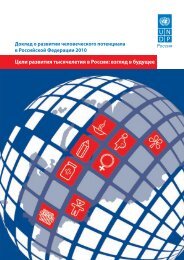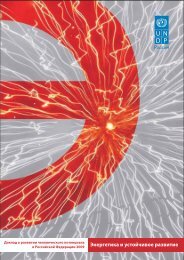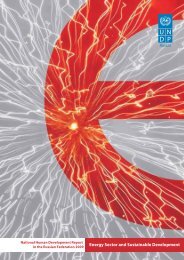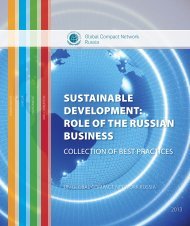Report - UNDP Russia
Report - UNDP Russia
Report - UNDP Russia
You also want an ePaper? Increase the reach of your titles
YUMPU automatically turns print PDFs into web optimized ePapers that Google loves.
Table 1.3Role of the energy sector in gross production:relation between primary energy production andGDP of selected countries/regions (tonnes of oilequivalent per thousand USD in 2000 at PPP)1990 2000 2007World 0.26 0.22 0.19OECD 0.16 0.14 0.12<strong>Russia</strong> 0.84 0.94 0.77EC-27 0.11 0.09 0.07OPEC 1.33 1.42 1.17Source: IEA (IEA World Energy Statistics and Balances – EnergyBalances of Non-OECD Countries – Economic Indicators Vol. 2009,release 01)Figure 1.3<strong>Russia</strong>n energy exportsM.t. oil equiv.160014001200100080060040020001971, USSR 1981, USSR 1991, <strong>Russia</strong> 2007, <strong>Russia</strong>Oil production Net oil exports Energy production Net energy exportsSource: IEA (IEA World Energy Statistics and Balances – Energy Balancesof Non-OECD Countries – Economic Indicators Vol. 2009, release 01)country. The real earnings of a large share of itspopulation, as well as the education and healthcare systems, are dependent on resource rent,either directly or through the mechanism of thegovernment budget. So there is a threat ofpoverty, social instability, limited access tomedical and educational services, and reductionof overall living standards in case of a fall inexport earnings. This threat is not only short-term(causing such temporary difficulties as were seenin 2008–2009), but also long-term, in case ofdevelopment and large-scale application ofalternative energy technologies by importingcountries. We doubt that such technologicalbreakthroughs are likely in the next 10-15 years,but a changeover of this kind is more probableby 2030. Export earnings could also decline dueto lack of investments in extraction segments,which would confront <strong>Russia</strong> with a dilemma:whether to limit exports or domesticconsumption. This problem does not exist atpresent, but the worrying trends mentionedabove make it important to give thought to sucha scenario.<strong>Russia</strong> itself consumes around half of theprimary energy, which it produces. This includesover two thirds of extracted natural gas and coal,and around on third of crude oil. It is thereforequite wrong to describe <strong>Russia</strong> as a ‘petrostate’,functioning as an energy donor to the developedworld. Energy efficiency of the EuropeanCommunity, the main recipient of <strong>Russia</strong>nenergy, depends on efficient utilization of theseimports, which represented about 40% of allprimary energy consumption in the EC in 2008.It is true, however, that the share of energyconsumed domestically has significantly declinedduring <strong>Russia</strong>’s changeover to a market economy.This is evidence that the country’s economy hasbecome more energy efficient, requiring smallervolumes of energy. Energy intensity of <strong>Russia</strong>n GDPhas declined by more than 40% since the peak in1994–1996 and is 25-30% lower than in the 1980s.This process has not been met by relevant increasein energy consumption (since growth of internalindustrial production and consumer demand hasnot been sufficient to cause a significant growth ofabsolute consumption).The <strong>Russia</strong>n fuel & energy sector wasincreasingly geared to exports by the mid–2000s(Figure 1.3). Increased export orientation of<strong>Russia</strong>’s energy industry can be tracked over alonger period of time, though comparison withthe USSR can be misleading: in the USSR <strong>Russia</strong>was in effect an exporter of energy resources toother Soviet republics, but (naturally)international trade statistics did not show thisfact until after the collapse of the union state.The trend began to reverse from 2004 asa larger share of crude oil was consumed insidethe country for refining into oil products (Figure1.4). The share of oil products, which were18 National Human Development <strong>Report</strong> in the <strong>Russia</strong>n Federation 2009












